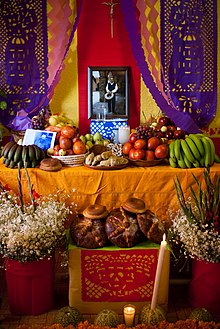Portal:Religion
The Religion Portal
Religion is a range of social-cultural systems, including designated behaviors and practices, morals, beliefs, worldviews, texts, sanctified places, prophecies, ethics, or organizations, that generally relate humanity to supernatural, transcendental, and spiritual elements—although there is no scholarly consensus over what precisely constitutes a religion. Different religions may or may not contain various elements ranging from the divine, sacredness, faith, and a supernatural being or beings. (Full article...)
 Vital article
Vital article
Theravāda (/ˌtɛrəˈvɑːðə/; lit. 'School of the Elders') is the most commonly accepted name of the oldest existing vehicle (yana) of Buddhism, the other name being Hinayana. The vehicle's adherents, termed Theravādins (anglicized from Pali theravādī), have preserved their version of Gautama Buddha's teaching or dhamma in the Pāli Canon for over two millennia. (Full article...)
 Did you know (auto-generated)
Did you know (auto-generated)
- ... that Musa va 'Uj depicts figures from all three Abrahamic religions?
- ... that religious studies scholar C. Jouco Bleeker believed that religions are like acorns?
- ... that a religious community is a group of people who practice the same religion, but do not have to live together?
- ... that the capital of South Ossetia once had more Jews than Ossetians?
- ... that the Grave with the Hands commemorates a married couple, divided by society and religion, with hands clasped over a cemetery wall after death?
- ... that Freedom of Religion South Africa filed an unsuccessful lawsuit to keep child spanking legal?
Gaius Julius Caesar Augustus (born Gaius Octavius; 23 September 63 BC – 19 August AD 14), also known as Octavian (Latin: Octavianus), was the founder of the Roman Empire. He reigned as the first Roman emperor from 27 BC until his death in AD 14. The reign of Augustus initiated an imperial cult, as well as an era of imperial peace (the Pax Romana or Pax Augusta) in which the Roman world was largely free of armed conflict. The Principate system of government was established during his reign and lasted until the Crisis of the Third Century. (Full article...)



































































